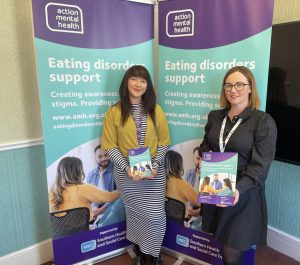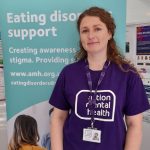At Action Mental Health, we provide one-to-one support services to people living with eating disorders throughout the Southern Health Trust area, including their family and carers.
Preparing people for assessment and treatment: This involves developing their self-supporting skills, educating about food behaviours and improving support networks.
Stepped-down programmes: These are aimed at people being discharged by the SHSCT’s Adult Eating Disorder Team or those who aren’t being treated by the Trust but still require support at a community level.
Five-week health and wellbeing programmes: Delivered throughout the year, these allow service-users to learn new creative skills to support their recovery, e.g. photography, mosaic tile making, felt-crafting, creative writing, decoupage.
BodyTalk workshops: These sessions educate young people and adults about eating disorders and help to build awareness on this topic. They also improve self-esteem and resilience and signpost participants to the appropriate support services. Workshops are available for schools, youth and other organisations within the SHSCT.
Eating Disorder Awareness workshops: These workshops are available for SHSCT staff and other healthcare professionals (e.g. mental health practitioners, GPs, dentists, social workers etc.). The aim is to equip staff with the skills and information to support and signpost individuals they work with who may be experiencing, or be at risk of, disordered eating and eating disorders.
Monthly Carers Support Group – This group helps families and carers gain a better understanding of how to best support their loved ones living with an eating disorder, whilst being a safe space to share their own experiences, and learn about practical tips and relevant information to support recovery. The group meets in various locations across the SHSCT.
Individualised 1-2-1 support for Carers and families – This involves building on a family’s understanding of eating disorders, equipping them with tools to manage any difficult situations and finding ways to practice their own self-care and support their own well-being.

At Action Mental Health, our ‘recovery through partnership approach’ means we work closely with the person, their family and the SHSCT to ensure more comprehensive, personalised support towards recovery. As the first port of call after someone seeks help, we’re there from the beginning, remaining with the client until they access medical experts directly and also offering support when the time comes for discharge.
We provide relevant information and support so people can develop skills that help them stay focused and healthy until they see a therapist, ensuring that they always have someone to talk to at every stage of their recovery journey.

If you or someone you know requires our support, then you can access our team in the following ways:
Self-referral: Give us a call or send an email.
Third-party referrals: These could come from your GP, a community organisation or a mental health practitioner.
Our team will make contact with you and offer an appointment within two weeks.
At that first appointment, we’ll go through a contact record which will assess your support needs and identify whether any additional signposting is needed, before agreeing on a personalised support plan.
Our full-circle support means there’s someone on hand to help you every step of the way – right from the initial moment you reach out. We can also provide updates, with your consent, to healthcare professionals, so you don’t have to repeat certain information over and over.
At Action Mental Health, we understand that asking for help is a huge step and we’re here to help bridge the gap between seeking treatment and receiving it.

Deborah McCready – Full-time Project Worker (Monday – Friday).

Lorraine McMinn – Part-time Project Worker.
An eating disorder is a complex mental health condition which essentially involves someone using food as an emotional tool. People with an eating disorder control food and their body as a way of relieving distress or managing their emotions while achieving some degree of control over their life. Their eating disorder subsequently provides them with a sense of safety.
People of any age, gender or background can have an eating disorder but due to the stigma surrounding this, it can be difficult for them to seek help. Sometimes dismissed as a ‘diet fad’, a ploy for attention, or simply as ‘normal’ behaviour, an eating disorder is not a lifestyle choice, however, but a serious mental health condition.
Research suggests that as many as 1 in 20 people will develop an eating disorder over their lifetime. It is therefore important to raise awareness of this mental health condition throughout our community and provide much needed support and training within this area.
If you feel in crisis, you can call Lifeline on 080 8808 8000 24 hours a day, seven days a week.
Do you want to conquer your fears and take......
You can now run in a huge number of......
If you need any support with your fundraiser please......
Make a secure, online donation to AMH or set up a fundraising page through Just Giving.